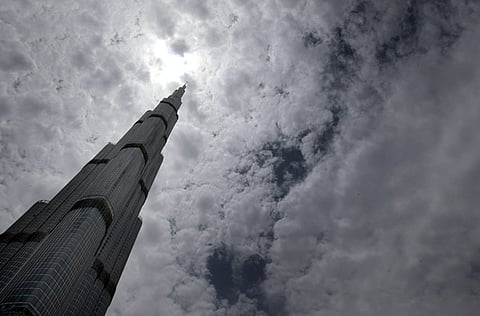Longer fast on higher Burj Khalifa floors
Dubai grand mufti explains how high altitude affects ruling on ending the day’s fast

Dubai: Residents on the higher floors of Burj Khalifa, the world’s tallest tower in Dubai, should end their day’s fast a few minutes later than those at ground level, a top cleric has said.
Ahmad Al Haddad, Grand Mufti of Dubai, explained that the fast lasts until the complete setting of the sun, which is visible for a longer time at high altitudes.
According to astronomers, the sun rises earlier and sets later at higher altitudes compared to the same location at ground level.
On a plane cruising at 12,000 metres, for instance, the variation in altitude is approximately linear, meaning sunset is later by one minute for every 1.5 kilometres in altitude, and sunrise is earlier by the same amount of time.
In high-rises that have less than roughly 80 floors, the difference in timing is negligible. However, people on higher floors should have their iftar, the meal taken to end the day’s fast, a little later, advised Al Haddad.
“People living in high-rises should take into consideration the difference in timings, as the night starts a little later for them. They can still see the disc of the sun — how can they end their fast if that is the case?” he said.
The day does not technically end in Islamic tradition until the disc of the sun has fully disappeared below the horizon. On very high floors, the sun is still visible even though it appears as set to people on the ground.
Al Haddad said people in skyscrapers should take this difference in consideration just as they would if they were in a different city or country.
“For Burj Khalifa, the difference in iftar is around two minutes later for those living between the 80th and 150th floors, and three minutes on higher floors.”
It is a religious duty to ensure that the sun has set even if the call to Maghreb [sunset] prayer has been sounded, Al Haddad said, as sunset is not complete until the disc of the sun can no longer be seen.
He added that people should follow the same rule and take the difference in timings into consideration for Fajr [dawn] prayer and suhour, the pre-dawn meal.
Al Haddad also explained the ruling with regarding to ending the fast while on a plane.
“People should break their fast according to the country they are in — in other words, wherever the sun sets on them. If a person was on a plane, he should not end his fast until he sees the sun set and can no longer see the disc of the sun,” he said.
He pointed out that it does not matter what time iftar is in the country he travelled from or is going to, as he is instructed by God to end the fast according to the time and place he finds himself in.
“He should also perform Maghreb prayers only after sunset, as per the ayah [verse] 187 of Surat Al Baqarah of the Quran: “Then complete the fast until the sunset.”


